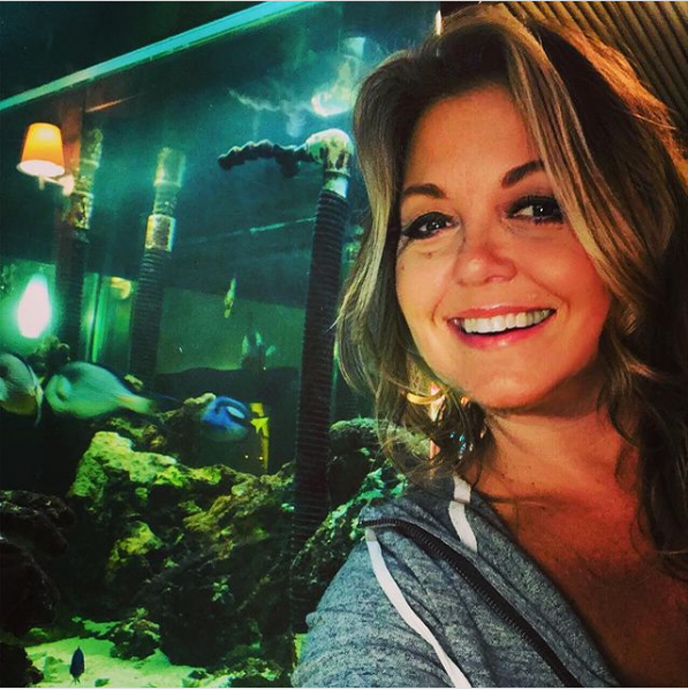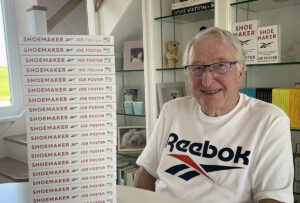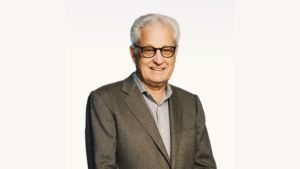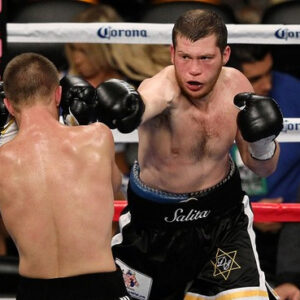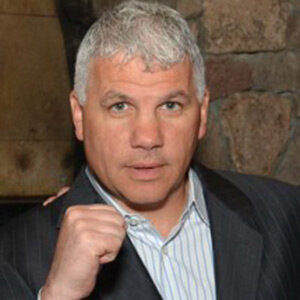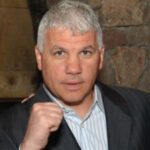Click below to view this episode's trailer.
Listen on your favorite podcast network.
“Heather Steele shares what it takes to have a breakthrough life.”
Heather Steele knows beyond any doubt that she trains the world’s best life coaches. How does she do it? She trains coaches to focus on helping their clients live their best lives. Period. As the founder of Legacy Training International, she uses her holistic approach, rooted in the client’s innate ability to grow, learn and heal to teach people to have a breakthrough life, not just a string of emotional highs or immediate gratification.
What exactly is breakthrough? Heather explains that when she’s in a place of ease and flow, she’s experiencing breakthrough. But to live a breakthrough life, you need a serious commitment to creating a vision for yourself and, what she calls, “a practice of impeccability” where intentions and actions align. It’s not about being perfect, but rather, being responsible for yourself and making a difference for others.
Small decisions have a huge ripple effect. When you take responsibility for your words and actions your life expands. When you get rid of things that consume your energy but don’t align with your life’s purpose, you are free to do what’s good for yourself and others. It’s important to have the right support network to do the work of emotional healing, and that’s what Heather’s business of training holistic life coaches is all about. The more qualified coaches there are, the stronger the network and possibility of every person living a breakthrough life.
Heather will challenge you to clear out the cobwebs of your mind! What are you listening to? Are you surrounding yourself with like-minded, positive people? Are you sharing love? Thinking of things in terms of light and dark, not good and bad, is the first step to clarity. Everyone has preferences. It’s when we try to control other people’s choices, that we lose the ability to connect and influence.
Be a seeker of impeccability. You’ll be humbled by the fact that you can never get there. The gain is in the striving.
To learn more about Heather Steele, check out https://www.heathersteele.com/. We’re always Tougher Together! Please tune in to other episodes of our Breakthrough podcast and explore the human connection between us.
Rebeccah Silence, is a speaker, coach and international media personality, who survived cancer while pregnant and has impacted hundreds of thousands of listeners through her radio programs and appearances. She is the Creator of the HEALING IS POSSIBLE movement and courses and is committed to helping others heal their traumas. As a certified world-class Emotional Healing Coach, Rebeccah is uniquely qualified to facilitate breakthroughs to wellness and transformation while she inspires hope and possibility in even the most challenging times. She is best known for healing heartbreak, and her clients frequently tell her that she brought them “back to life”!
TRANSCRIPT
Rebeccah [00:00:00] You’re about to meet my spiritual teacher, the person that introduced me to the possibility of breakthrough, which saved my life. Owner of Legacy Training International Heather Steele is here with us to teach us what a breakthrough life is and how to get there.
Intro [00:00:15] The Tougher Together, Breakthrough podcast is brought to you by RebeccahSilence.com. Visit RebeccahSilence.com and check out the online courses designed to help people like you stay tough. See for yourself. So, what is a breakthrough? It’s finding your way out of suffering and stuck. It’s that feeling of new energy, renewed life and excitement. When I was seven months pregnant with my second baby, I received a life changing diagnosis. I had cancer. When I told my older daughter, she said “So, you’re going to die?” And the only thing that saved my life during that time was knowing how to emotionally break through. Welcome to the Tougher Together, Breakthrough podcast. I’m your host, Rebeccah Silence. I’m a speaker, coach and the creator of Healing is Possible. In each episode I prepare you for life no matter what challenges you’re facing. I’m going to invite you into the stories of real people who are living life in breakthrough and making the world a better place. If they can do it so can you. Breakthrough is your right. Get ready to break through. Get ready for the rest of your life.
Rebeccah [00:01:42] Are you ready to meet the person that trains the world’s best life coaches? Well, here she is. Heather Steele, owner of Legacy Training International, trained me. My mentor, gift to my life, and gift to all of us is here to share about breakthrough and what it really takes. Heather Steele, welcome to the Tougher Together, Breakthrough podcast.
Heather [00:02:06] Thank you, Rebecca. I am so excited to be here with you, and I’m just honored to be on the show.
Rebeccah [00:02:13] I am honored to have you. So, tell us what a breakthrough is and what the work of training coaches and living in breakthrough has meant to you and your life.
Heather [00:02:27] OK, well, let’s start with what a breakthrough is. As I was thinking about this podcast, I was thinking that, you know, a breakthrough to me is different than me training coaches to create breakthrough for others. And so, I’ll start with myself. A breakthrough for me personally is when things are at ease. I’ve had several moments in my life that were very difficult. For example, I was one of the people that got COVID for 40 days. A breakthrough during that process is when I became at ease and in the flow through a traumatic experience. The same kind of breakthrough could happen in jumping out of an airplane in a parachute when you’re also, you know, in a terrifying experience, but it’s at ease and in the flow. So, for me personally, if I’m at ease and I’m in the flow, I tend to think that I’m in breakthrough. I tend to think that I’m in that space of gratefulness and appreciation, and life is short. And this moment right now is the best moment I’m ever going to have. That, to me, is a personal breakthrough. When I’m training coaches about breakthrough, I actually have a curriculum that I teach how to get to a breakthrough by doing the curriculum, and I’ll make it simple. It’s basically when your client or you as a human being, needs to have a vision for yourself. And it needs to be one that you not only believe in, but also that you have never, you know, never seen possible for yourself, but you just kind of know that you could do it. And that vision needs to be committed to, and commitment is very, very different than attachment. And you’ve talked about this before in your work, Rebeccah, the difference between commitment and attachment. So, commitment is that you do that deep, deep cleanse of self and like, why do I want this vision? Why is it important to me? How will it impact others? Is it coming from fear? Is it coming from a less than? Or is it something that I really think I’m able to create and make possible just because I’m, you know, able to co-create with a life? And if you can get passionate about it, and I will guarantee you that the good ones are only and always love. And so, you know, if you can fall in love with like, I have this vision for kids or animals or the ocean or life coaches, that’s the first step. And then the second step would be, you know, am I in a practice of clarity meaning that, you know, can I stay with this commitment even when I’m unclear, even when it’s hard, even when people leave me? Am I clear that this vision is what propels my life forward, not the attachments in my life, not my financial situation, not the people in my life? That vision will propel you forward, and it is sometimes very difficult. And then the third thing and this is where life coaching comes in is a practice of impeccability and impeccability is not perfection, you know. In the book Spiritual Warrior talks a lot about being a spiritual warrior. And for me, the word war means opposites. It means there’s a light and dark. There’s two sides of yourself. So, the test of impeccability in a practice is actually the seeking other in each moment. Is this an impeccable moment? Is this an impeccable sentence? Am I being impeccable with, you know, what I’m doing? Are my intentions and actions aligned? Eric Plantenberg talks a lot about that in his work. So, the seeker of impeccably. And then also to be humbled by it. To know that you never can be impeccable. That is always a journey forward to that vision and commitment and love. And then also just, you know, an action-based step by step routine every day. Am I in action towards my vision? So to me, that’s breakthrough, too. It doesn’t necessarily feel like ease and flow. Like my first example as a personal person. But you know, real breakthrough isn’t necessarily ease and flow. It means confronting your dark side. It means staying committed when it’s not easy, it means taking full responsibility, accountability when you really think it’s the other person’s fault and it means not being attached to money or time or anything. I mean, that is not necessarily always the experience of ease and flow. But for me, that’s also breakthrough. You’re breaking through to something that’s worth, you know, going through the committed path of impeccability or struggle to get to, it’s almost like that break in the light. It’s almost like, yeah, that top of the mountain.
Rebeccah [00:06:53] So I do want to acknowledge that Eric Plettenberg will also be on this season. You just referenced him, but will you speak more to what makes it worth it? How would someone know that this is a breakthrough worth going through the dark? Because it’s so easy to talk ourselves out of it.
Heather [00:07:13] OK, so I would just go back to the word love. You know, I think people measure love and they decide that this feeling is love, that this feeling isn’t, or this way of life is love or this way of life is not love. And I think that when you have a vision of love for all people and a full, you know, accountability for I am human, I am small, I make a small difference with a huge ripple. Every single one of us ripples every one who ever crosses your path from the janitor to, you know, some famous person you meet someday. And none of them are less important than the other ones. So, what makes it worth it is when you’re in that path of breakthrough or in that experience of ease and flow, you see love. You see love in other people. You see the most wounded people as the most committed warriors. You see the most judgmental and harsh people as people that really care about something and maybe don’t know how to communicate it. Or maybe they’re coming from immense fear. You see the sickest people as the strongest. You see the world from a place of connection and that vibration, for lack of a better word, that way of being has… you have the right person show up in front of you and give you the right job or you have the right friend that just is there at that perfect moment or you have a moment, for me in example, you know, in COVID, where I just intuitively knew which doctor to actually listen to and which people to actually have in my space. And, you know, have that moment with my cat on my chest looking in my eyes, you know, while I’m trying to breathe and I’m just like, in this moment in this miracle of love. This is the best moment of my life, you know? That connectedness makes it worth it, and it’s hard to describe it until you’ve done it. But we are fear-based people. We can’t help it. We have a physical body. Things are scary. We think we need, you know, money and friends and the perfect family. And you know it just, it’s so short; this lifetime is so short. And if you can just get to that place of like, I am committed to every single moment that I’m in, the moments add up. The breakthrough is worth it. It’s always worth it because you see love and you feel love and you are love. That’s really what we are.
Rebeccah [00:09:42] When you talked earlier about how people measure love, will you say more about that? And is there love available in every moment?
Heather [00:09:50] Yes. So yes, I’ll say more about it. And yes, there is love available. How do I want to say this? Well, I’ll give a personal example. So, when I was going through my divorce, one of my biggest fears is that I would harm my child because I was getting divorced. And then, as my child had questions about the divorce, my next fear was that I would be, you know, that he wouldn’t understand how much I loved him, or that maybe I would be wrong in the story of the divorce. And I went through what a lot of divorced people go through where you’re trying not to throw the other person under the bus, but at the same time, you want the child to understand your choices. And it all came from like a neediness, an identity and ego. And in that way, I was measuring love; if I say it the wrong way my son may not feel loved as much. If I say, you know, a way that impacts his dad, maybe I’m having a ripple of love in that way. If I don’t stand for myself, maybe I’m not loving myself enough and having my voice and have all this ego and identity. And in that way, I’m measuring love. You know, when you just speak your truth and own it there is no manipulation in it. You’re not trying to get someone else to feel a certain way. I think about people who get married, you know, when you go down the aisle and you’re looking at your partner. You know, what are you doing? Are you really in that space of what else can I give you? What else can I give you? What else could I do for you? How else could I be for you? Most people aren’t doing that. I work with couples a lot, I do relationship intensive as I do a lot of weddings. They’re usually thinking about what they’re going to get. And in that marriage, when they don’t get it, the love is measured. Well, before you did this, that and the other for me, that’s when you loved me. But right now, when you’re mad and angry and being disconnected from me, now, you don’t love me anymore. This is where people go into a lower mindset and start looking for the grass is greener on the other side, or don’t, don’t do the deeper work. So, our brains are linear. You know, we just, we know that we’re born and we live, and then we die. We know there’s a beginning, middle and end to everything, and we start make enough that we can have some measurement of love in our lives. What I’d like to say instead of a measurement of love. How about just have a preference? How about just have a preference of what you know you like that way you own it. Your ego and your identity is like, I just like this better. OK, great. We all understand now. And it doesn’t have to be a reason for it because love is everything. And yeah, you can find love in every moment, for sure. You know, and it’s horrendous when you think about it, because with all the issues that we’ve had lately, there’s love there. You know, there needed to be an undercurrent of voice and there needed to be a magnifying glass of voice and there needed to be, you know, a pandemic, actually. You know, I look at it that way. It’s like, this is where we are now. This is the most magnificent moment in our lifetimes. Why? Because it’s now. It’s our lifetime. This is the lifetime you have and you get to be in a pandemic and in the middle of Black Lives Matter, in the middle of all these different issues. This is the most important time now. Show up and be in it because you know what? You’re making history and you got great, great grandkids that will be impacted by what you’re doing and saying right now. And so even in the struggles of today, I still see it as the most loving moment we can be in.
Rebeccah [00:13:24] And you spoke earlier about vision. I’d like to ask you to talk more about that because how do people access the vision for their lives, for the world when they’re in break down?
Heather [00:13:40] Well, I have, you know, I’m kind of as positive as I, you know, and talking about love because I really do believe what I’m saying and I do live that way. I’m also very cynical about people going for that high and that attachment. And so, the word life purpose gets thrown around a lot and people think they’ve got to do something big, write a book, be a life coach. You know, they think that’s their life purpose. And I like to play with that word and say, you know, when you’re at the lowest time, like what you just asked me and someone comes up to you, a life coach or anybody, it’s like, What’s your vision for yourself? What do you really want for yourself? That is not the time that you are the most creative, you know, most flowing. You know, when you’re in deep grief, sadness or rage, you’re not really that creative, actually, you’re just kind of needing to emote and heal and be the wind of change in your life. And you know, anything coming out of your mouth is going to be, you know, pretty, pretty dark, actually. So to me, if you’re in a low place and someone is asking you for your life, purpose or vision or how you’re going to get up again, the first thing you have to understand is they’re not OK with where you are. They’re not OK with where you are. They wouldn’t be asking you that. So, I say the first thing is you get OK with where you are. You know, whenever it’s like, What’s wrong? Can I help you? Can I fix you? Oh, we should get a vision. You should have a life purpose. How about no? How about you just be where you are and in that life purpose moment? Because that’s what every moment is. You get purposeful about loving you. You get purposefully loving your anger, loving your sadness, loving your grief. And you go, Gosh, you know, I’m a magical, creative, soulful being. Anything that’s happened to me, I didn’t wake up in the morning and try to on purpose hurt anybody. I didn’t try to, on purpose, get divorced or lose my job or say those mean things. None of that was on purpose. Those were human, you know, lack of being perfect reactions. Those were mistakes that we make. And sometimes we’re in a low place. Sometimes like you, Rebeccah, you happened to get cancer when you’re pregnant. Like, you didn’t wake up and do that to yourself. That just happened. And in that moment, are you purposefully loving every moment of your life where you are right now? So, a vision, a life purpose when someone’s low, I don’t usually talk to them about that. I don’t usually say, Hey, what’s your vision or life purpose? I usually say, Let’s just be here. Let’s just totally love what’s going on right now.
Rebeccah [00:16:24] And then what about when someone is maybe in more of a high vibe and looking for direction? What’s the difference then, because you’re really big on possibility and vision carrying us through?
Heather [00:16:37] Oh, OK. Well, first of all, get a coach 100% and don’t get just any coach. Well, I say get a legacy trained and certified coach that I recommend, actually, because that’s just how strong I feel about people like you, Rebeccah, and other coaches that I’ve trained. Get somebody that you believe actually has skin in the game for you. Get somebody that you believe actually can hear from a filter of non-judgment, or at least is looking at their judgments of they do have judgment. Maybe they back up and they can kind of go, you know, where’s that coming from? Let me think about that. That’s triggered or that’s activated. Get somebody who enjoys facts and reads and education and has some sort of world view and actually knows what’s going on, on some level. Get somebody who you know is not perfect but is perfectly aligned with what you’re up to and perfectly aligned with what you believe in, for yourself and for others. So, I would say once you have your vision and your life purpose, you better have a coach, you better have a person that’s helping you go through the steps because you’re going to need it. You know, looking in the mirror every day, doing affirmations and making a to-do list isn’t going to get you nearly as far as somebody confronting you on, Hey, you said you were going to do this by Friday. What’s up? Or you know what? You sound pretty nasty about your mom. Do you want to do a clearing process? Like, maybe we should get that stuff moved through? You know, you can’t go and speak to the world if you’ve got all this baggage that you’re afraid to share, you know the truth and transparency of your life. Maybe we want to clean up your integrity. So, I’d say, get a coach. The second thing I would say is get a structure of self-care, which is difficult when you get really, really busy and really, really successful. I know this one. My self-care was so much better when I was poor and had nothing to do. I could do my forty-five-minute meditation and then yoga and then the gym and I could make a smoothie. And, you know, look for a job, basically, you know. Once I had a really big job, it’s so much more challenging to put that time in for yourself. And that’s what I’m doing now. And I’m just realizing again how important that is. So, a structure of self-support. So, a coach, a structure of self-support, and then I would say, throw yourselves in seminars. You know, people, those of you that don’t do seminars, you’re really missing out. You want a place to grow. And I’m not talking about a yoga retreat, which is awesome. I’m talking about a personal development, professional development seminar where you get to be with amazing people, bigger, better and smarter than you and learn and, you know, up your game. You know, I can’t remember who talked about Stephen Covey or something, talked about the five people around you. I can’t remember who it was, but, you know, kind of make sure those five people are people you like, people that are up to something, people that have aligned beliefs and, you know, raise the vibe, raise your environment. The space is everything. The space you’re in is everything. Go clean your car, go clean your house, go clean your colon, clean your mind.
Rebeccah [00:19:53] Will you talk more about clearing. You’re talking about cleaning. You mentioned the word clearing earlier. Tell people what that means. And maybe if it feels right, like give them a mini process that they can try on. Because you’re talking about with seminars is literally confronting the dark. Yeah. And everything in the way of that vision that you’re going in.
Heather [00:20:15] This is such a great question. So, let’s first of all, talk about light and dark. So, dark is just dense, slow energy, right? We think it’s bad because it just makes us kind of feel bad. So, you know, if you’re someone who’s dealing with, you know, a darkness around a relationship or a darkness around your body or darkness around money, you know, the more you think about all the things, you know, going wrong and all the lacking in those areas and all the, you know, not ease and flow of it, you know, the heavier and the heavier and the heavier you get. And it’s like you’re a magnet, you know, sort of you attach to those thoughts, attached to those beliefs and you have a bunch of friends that believe the same way. And you all talk about all the times you reprogram those neural pathways that your brain is just like, Yep, it’s bad. It’s so bad. Boys are bad. You know, you got to kind of be like a producer, you know, with your own brain. You know, your brain on autopilot will go into neural pathways of just, you know, whatever you’re used to, honestly, or you know, it’ll be from what your grandmother said or some intense experience in your timeline, or it’ll be just who you’re talking to right now and you’ll actually think it’s real. You know, I think there’s a point, you know, that you got to step back and go, What am I listening to? What am I actually saying over and over again? If it’s believable is it worth believing? You know, when I talk about love, is it worth doing that? Is there a reason to do that? Does it do fun, happy, good things when I talk about love? You know, does it make everybody fall down, start crying and, you know, being a pitiful lump on the floor? No. Usually, when someone feels like you love them, you’re connected to them, you care about them, they get up. They start to grow. It’s like a flower getting water and sunshine. So, yeah, so dark is dense. Dark is slow, thick energy, and it can show up in your emotions. It can show up in your physical body and illness. It can show up in your brain with all those nasty, heavy thoughts that you might be having. It can show up in attachment to things and looking good and identity, so that’s what I’m calling dark. It’s not bad. It’s just a way to be. And then the light is lighter. It’s chilly, lighter. I have to heal. I just did a seminar in Sedona, Arizona, and I had a healer come to my room and I was talking to her about, you know, whether I should be a vegan or vegetarian again because I did that for a long time. Or is it OK to eat meat? Because, you know, I love animals? And what about animals with eyes? And, you know, I just had this big conversation. She had a great answer. She said, You know, when you’re going to have a heavy duty day, you’re going to climb a mountain, you’re going to facilitate, you know, people, you’re going to be in the trenches, you know, you’re going to do hard work. She goes, Your body needs energy and animal energy. Animal protein is probably going to feed you because you need that strength. On days that you’re sitting around you want to meditate, yoga, you know, love somebody, talk, have a good conversation, cup of tea. Go ahead, be a vegan that day. She said start, you know, moving in light and dark. She was talking about food. She was actually calling like an animal food like dark or denser, heavier proteins. Heavier food to digest; it takes a lot of time for your body to digest meat. So, it’s like she was talking about that. I loved it because I thought, OK, that’s the same thing with a thought, and that’s the same thing with an emotion, and that’s the same thing with your actions. There’s a time for, you know, denser, darker thoughts. If I’m really trying to make a change on an issue, I might come across as kind of dark and dense and in your face. And, you know, wake up, people. You know, there’s something happening here and clean up your mess and all that. And then if I’m in a different space, I might be a lot lighter. So just asking about, you know, light, dark and clarity, I think having clarity about that, I think that’s the first step with clearing. You know, if you look at your house and it’s a mess, it’s not bad. It’s just, you know, hard to walk through. It just takes longer to find things. You know, it just it’s too… it’s disappointing when family is coming over because then you’re like stressed out trying to clean up. If you have a hot date, you might have wanted to have had your house clean, all ready for it. So, you know, thinking of things from a neutral place of light and dark is one step to clarity. That way you can heal in your relationships. You don’t have to look at somebody in your family and say, that’s a bad person because they said that or they did that. So that’s the first step to clarity. And then I think the second thing I’m talking about with clearing is, you know, clear your mind. I mean, there’s a rock song about that, right? Clearing your mind?
Rebeccah [00:25:04] Yeah. Clear your mind and the rest will follow.
Heather [00:25:07] Yeah, exactly, so clear your mind and clearing your mind just means OK, I’m really, you know, activated and read up about this, you know, this is… I’m being very funny now. This is a fun… Boy, look at me, jump around and just, you know, I am a loud, crazy person out there when I get revved up like clarity about the humor and who you are. You know, you are a person who really is significant in some ways. You have different DNA than the next person. You have a family that’s different than the next person and you have, you know, dreams and hopes and an imagination and a beautiful brain that’s different than the next person. And then you’re a person, OK, you’re a person, which means you’re exactly like the next person. So, you know, the most powerful we can be and the clarity of thought I have about this is when we are connected to the light and dark of all people, and we find that common golden thread of heart, song, love, compassion. And we don’t have to hang out with people that aren’t that fun for us. If you’re kind of, if you like the light side and there’s a bunch of people in your space that are kind of on the dark side, you don’t have to hang out with them, but you don’t have to sit there in your dense energy, you know, throwing, you know, minded darts at them, right? And you know, and if you are going to take incredible, strong action, which I have many, many times and fire somebody or say what you think or be nasty or mean, you know, be accountable for that. That’s what you said. And that’s what you meant at the time. And that’s what was going on at the time for you. Doesn’t mean that you were clear. Doesn’t ever mean that you were right, but you know, own where you are; own your lack of impeccability. So, yeah, clearing would be clearing your thoughts. And is this aligned with my vision and my commitment? Do these thoughts help me get there? Clearing your emotions, just have them. Don’t put a story with them. That’s just silly. If you’re crying, you’re crying. You don’t need some sad story to cry about. Just cry, you know, and then you know your communication, you know, with every relationship, you know? Walk away and go, Was I clear? At least for me was I clear? They may not hear you. They may not be able to hear you. But was I fully intending in what I said? Did I say the right words? Am I, you know, immaculate with my communication or as immaculate as I can be? So that’s what I mean by clear.
Rebeccah [00:27:36] And I’ve heard you talk a lot over the years in our profound deep work together, and we’ve been on quite a journey about how when you make other people wrong, you lose all power.
Heather [00:27:48] Yeah, there’s an exception to that and I thought about this the other day. If I’m one on one with somebody and I make them wrong, meaning that I think they’re wrong and then I tell them they’re wrong, and you know that’s my stand. You know, who likes that, right? I mean, that’s what I mean by you lose all power. You know, if you’re with a marriage and you’re making your partner wrong, they don’t hear you. You’re just venting. They don’t hear you. They don’t want to hear you. You’re icky to listen to. OK, so you’re not fine and you certainly aren’t enrolling them to see your side. And you know, you have no power. You have no power when you make something wrong. But I thought about this the other day, Rebeccah; if a group of people make a thing or a person or a way of being wrong, it has a lot of power.
Heather [00:28:43] Ooh, I got chills.
Heather [00:28:44] Right? Right? So, I was thinking about this. Like, I always say, you know, if you make something wrong, you have no power. And then I feel like saying, unless you’re in a rolling and charismatic and a leader now you can go get your little following and then you say something’s wrong; if they’re not awake, if they’re not thinking for themselves, if they’re the type of people that just like to follow more than actually sit back and go, What am I following? Guess what? You could probably make a lot of people wrong, and I think this is one of the things we’re dealing with right now is groups of people that made other groups of people wrong. So, I’m saying two things, you know, yes, you lose power when you make somebody in a relationship with you wrong and then you have a lot of power when you make an entire group around yourself and decide that that group of people is wrong or that way of being is wrong. I’ve been playing with that one a lot because I’ve been making a list of all the things that I think are wrong. And, you know, I even hate to admit that because I don’t even like thinking like that. You know, we tend to do it on autopilot, like, well, that shouldn’t happen. And that person should pick up their trash and that person shouldn’t smoke. And that person, you know, needs to do this, that and the other. And in a way, you’re making it wrong. And I just think that, you know, changing the word to preference and honoring that everybody, you know, honoring that everybody… You know, they get to be here, too. They get to have their thoughts, they get to have their emotions, they get to eat what they eat, they get to do what they do, they get to have the life they have. And you don’t actually know. So, you know, at least start there that you don’t actually know.
Rebeccah [00:30:30] Yeah. Yeah. And getting real about the dark and the light of it.
Heather [00:30:36] Yeah. I went through a lot of fear. You asked me and in your email to me, just like some challenging moments and breakthrough. I had people that I love that I feel like if they made different choices, they would have better lives. But when I get so, you know, up in arms about the choices that I think they need to be making so they can have a better life, their life becomes tremendously less fun because I am now some tyrant in it, telling them what choices they should make instead of the really find a happy loving person that I am. So, I turn myself into like the voice of shame or something I don’t know, you know, and it’s like, and then they’re like, OK, my life just got a lot less because now I don’t want to hang out with you. So, I’ve been thinking about, you know, can I be with choices that are scary to me that other people make, whether it’s a child or a partner or a business person that I work with? Those are hard things to do. And I think getting to the point of going, you know, I get that that’s your choice. And it’s really, really hard for me to see you make that because it scares me is a really honest way of dealing with people. I’m just scared when you make that choice and I still love you and I’m not going anywhere because you made that choice.
Rebeccah [00:32:02] Mm-Hmm. Now I want to switch gears a little bit because you also teach and train coaches around breakthrough having an emotional component and maybe even the emotional piece is everything. Will you speak to that?
Heather [00:32:18] Yeah, you’re asking me such great questions. So, believe it or not, in my experience, the way to access a client and have real change is through their brain first, because they won’t turn it off and they won’t get out of the way, meaning that they won’t kind of trust the process or dive into a deeper level of healing until they’re convinced. So, a really good coach actually has to get through all the stories, all the things that happened. They have to understand how the person learns, they really have to be in with the brain work of the situation first. But the reason I say emotions is everything is usually that brain went into an autopilot because an emotion or a trauma didn’t get resolved. So let me give you an example if you have a child that was really, really scared and they were in an environment where it was terrifying, and it never changed. Well, that emotion called fear just immobilized that; they couldn’t do anything. They just froze. It’s a useless emotion for that child. So, you might have that person in your coaching office and they do completely careless things. They put themselves at risk all the time. They don’t even feel scared when they should feel scared. So, in breakthrough work around emotions, it’s like, Oh my goodness, I got to have this person hit their fear that they never felt safe to have. They’ve never known that I’m scared someone comes in and nurtures me. They don’t know that. So, what do you do? You have to help them set their life up for that, you know, rescue net for when the fear comes in. So, when I say emotional breakthrough is everything, I mean, that’s the gold, but you can’t rush that breakthrough because you might reactivate trauma in someone who’s not ready to have it. So, this is why I created Legacy Training International and a curriculum that goes with it. It is irresponsible, actually, to force an emotional breakthrough for someone who doesn’t have an environment set up at home to support them, doesn’t have a coach, doesn’t have a support person or doesn’t have the money to continue to pay the coach. That’s another thing you have to look at. So as a, you know, an answer here, yes, breakthrough is emotional because—this is the caveat—if you get your client, you know, or yourself in a place of like, you know what? My environment can handle it, my money can handle it, my wellness can handle it. I’ve got some good friends. Actually, I’m in a really good place to revisit this repressed memory or repressed emotion. Great, have it; super healing, and it probably is that big, big breakthrough that launches you forward. But until you’ve got your integrity set up, until you’ve got some systems set up around you, people will avoid emotion all the time. There’s no permission for it. Fear, anger. Anger is actually easier for people than fear. Fear, grief. Nobody wants grief because it just kind of hits you like in waves and you never know when it’s coming. You can be in the middle of the grocery store, you know. So, yeah, emotional breakthrough. You talked about this, you know, in some of your Healing is Possible work. Just emotional breakthrough means to move through. Carol Reynolds kind of gave us that when she was training both of us to move through something. And I would say that, you know, that’s true. You move through the sadness, you move through the anger. There’s nothing else to do but move through it. But before you force the issue, you also make sure that client and yourself is set up to win. Some of those emotions are deep. I’ve been very surprised in facilitation how fast someone can be, you know, on the floor or throwing up or truly having a memory. And you know, this is where, you know, coaching, you know, you need to really be good at your job before you’re coaching people. That’s my opinion.
Rebeccah [00:36:37] And I, in my opinion, anybody that is interested in becoming a coach or is already a coach and wants to take their practice and their service to the next level, I can’t recommend highly enough Legacy Training International and we’ll share how you can get a hold of her here before we end. But I am really trying hard, Heather, to sort through the questions I want to ask you because there’s so many. If you would be willing to speak to what breakthrough isn’t, I want to make sure we get to that part because you have said it’s easier maybe to understand what breakthrough isn’t than what it is, especially when you’re in your everyday life. So, I don’t want to skip that part.
Heather [00:37:19] I have a great example. Recent example. I have, you know, sometimes you fall in love with people you’re not supposed to fall in love with. They could be married. They could be the wrong sex, according to you, you know, and sometimes you have that breakthrough to love. And if that happens and it’s in integrity and alignment with your vision and your life and the ripple of it expands things, everybody is, you know, either growing or happy for you. There’s no integrity breaks, you’re not doing any harm, love, harmlessness. To me, that’s a breakthrough. But take the same situation. And let’s say it’s people that are married and in other commitments, and they fall in love with someone outside of the marriage. That feels like a breakthrough because you’re on that, you know, love bus high. So that feels like a breakthrough, but actually, it’s very constricted. It doesn’t expand the ripple. It doesn’t actually go out into the universe and make things better for everyone. It’s out of integrity. So, I would say what breakthrough isn’t is it’s not something that has a negative ripple on other people. So, if you got that big cash deal, but you know, gosh, it’s attached to a whole bunch of out of integrity things, you know, you’re going to make a lot of money, but the product actually hurts the environment? Probably not a breakthrough. So, breakthroughs are things in my world that impact the whole in a positive way that you can live with and it can go on your gravestone. She did that. It’s a way of being and it’s a way of living that you’ve thought about and you’ve been like, Is there any way this could impact someone else or something negatively? And if you can’t find it, go for it. So, a breakthrough is not a win that you get at someone else’s cost. A breakthrough is not the feeling of love in a completely inappropriate environment for you to act on that. A breakthrough isn’t I’m getting what I want. That’s not a breakthrough. A breakthrough isn’t… It’s not a seminar high. You know, just because you’re crying a lot doesn’t mean you’re in a breakthrough. You know, just because everybody loves you and a big puppy pile and thinks you’re the greatest thing in the world, you’re not in a breakthrough. A breakthrough for me, and I get everybody has a different definition of breakthrough, but a breakthrough for me means you are in breakthrough work around impeccability towards seeking it, being humbled by it and also eliminating the things in your life that consumes your energy, that takes you away from that vision and commitment as to what you said you were going to do, and who you say you are in this lifetime. So, I’ll say it one more time. A breakthrough is something that you’re seeking impeccability, a breakthrough. You’re humbled by that you do not know, all the time. You do not know. I don’t even know what a breakthrough is, in this moment is just what I think right now. And then it’s also a clearing process, really, of looking at what consumes my energy that doesn’t align with what I’m up to now or what I think would be good for the world right now. So, a breakthrough is never immediate need gratification. A breakthrough is never something you get that harms someone else. Oh, here’s another one. I love this one. I breakthrough is not like I need to have my voice. The reason I had a bad marriage is because I didn’t have my voice. No, that’s not. That’s not what happened. You know, we’re very self-consumed on autopilot, and most likely someone else didn’t get to have their voice either. So, you know, it’s not like a self-celebration. That’s not a breakthrough, either.
Rebeccah [00:41:22] So what about suffering?
Heather [00:41:24] I think that people do suffer needlessly sometimes, and I’ll take you back to my COVID example. You know, it was very difficult to not let my brain… You probably had this in cancer. I mean, now that I’m thinking back when we were talking, when you were having your cancer experience, it was similar. And I think in that I was sitting there going, OK, you know, my brain wants to go into: this is awful, I can’t breathe, you know, am I going to die? Oh my god, you know, how did I get the virus? I always wear a mask or whatever, right? Like, my brain went into suffering like really fast. And of course, some of the people in my life were scared. My son was scared. You know, people that loved me were scared, and I had to decide, you know, what I was going to focus on and I had my cat in my room, and I even had myself thinking I was going to give my cat COVID. Like, I even let myself suffer with that like, Oh gosh, I should get rid of my cat, you know, because I didn’t want to get my cat sick and my brain just in fear. Your brain just constantly suffers. What I finally got to is an acknowledgment of that it was physically difficult to not breathe. That is true. And that there were things I needed to do like stand up and test myself and call my doctor and take vitamin D. Like there were things I had to do because my body was absolutely suffering, but I decided to focus on that my mind did not have to suffer. That I could acknowledge my body, I could love my body, and I could say, you know, my mind does not need to suffer. So, I made up a Disney film in my mind that I was underwater because the nurse had said at the hospital that the amount of air I was getting was the same amount as what you would get when you breathe through a straw. So, I thought, well, if I was underwater scuba diving—I like to scuba dive—and there was a big coral reef and there was a bunch of magical fish at coral reef and I was out there, they would say, Come over to the reef, there’s a magical straw and you’ll have just enough air to get through this moment. And I put my mind there all the time, and my little kitty’s big eyes looked like a big fish to me, and I just sat there with that straw. And I was like, in this magical moment, until the rescue team comes, I have enough air right now. Thank God for this coral reef and thank God for this straw. And that’s how I kept my mind focused on the little tiny bit of air I had vs. all the horrible things I didn’t have. And eventually I healed. Not all of us got to heal. I feel really lucky, but I didn’t suffer I guess is my point. I stopped suffering. I still felt icky. I mean, I still didn’t feel good, but somehow my mind didn’t suffer. I just was kind of like, I was really in a magical coral reef. Now my nurse said it was a lack of oxygen and I was hallucinating. OK, possibly. But I’m telling you, I’ve had other moments where I wasn’t sick, like not enough money or not enough time or somebody, you know, doesn’t love me anymore. All these moments where you could really, really suffer and instead go, you know, why is this the most magical, miraculous, best moment of my life right now? In fact, my son said that to me the other day said, Mom, right now is the best moment of our lives, right now. And I was like, God, that’s so true because it’s all we have. So, of course, it’s the best. I can feel and break through. You know, honestly, two glasses of wine laughing with you. I can feel them right here. That’s easy and that’s flowing, and that’s fun. That doesn’t necessarily mean I’m up to, you know, saving the oceans in that moment, right? Or even thinking about it. So, I wanted to make a distinction like you can have breakthrough moments where you feel light and airy and easy and flowy. And that’s not how a breakthrough life is going to feel, because a breakthrough life is going to have conviction and commitment and hard decisions and hard leadership calls. And a breakthrough life is going to be some work. And if you’re not up for it, you’re not going to have it. You’re just going to have the glasses of wine.
Rebeccah [00:45:46] Yeah. What do you want people to know about support? You’ve been one of the primary supports in my life, seeing me as strong when I was sick, keeping the bar high, being the most ruthless of anybody in my life, ever, holding me to my greatness and my ripple and my responsibility and my gifts along the way. I mean the support you’ve been to me, Heather, was just priceless. I have so many stories in my Healing is Possible five-day challenge about you and I, but I want people as supported as I’ve been with Legacy, with the Legacy community, with you. What do they need to know to create that?
Heather [00:46:32] I have I have two answers to that again. I think I’m really clear that I can provide support for a very, very long time. Better, actually, than I can train people how to support me. And I think that that might be all of us in a way. So, when we talk about support, I guess step one is, you know, how would I support another human being? I guess the first question is what do they think they need to accomplish what they say they want? And then does it align with things that I can do? And then also, you know, what kind of support are they used to having versus what kind of support do they actually need? You know, so if somebody who is used to having immediate need gratifications wants me to go help them out with that as a coach, you know, but what they really want is integrity and an amazing, healthy life, you know, I have to look at, do you want that feel-good support that you think you want? Do you want that, you know, sugar and spice conversation, you know, that you think you want from me? Or do you want the kind of support that actually is going to give you what you said you want? So, I feel like that’s, you know, what I’ve done for a lot of people is get clear that if they’re wanting, you know, a cheerleader, that’s not me. If they’re wanting a coach, that is me. So, I know how to give that kind of support. I know how to be generous. I know how to give that kind of support. When you talk about support for myself and for those of you listening, how to get support for yourself, I think that’s more challenging to really like what is support? Well, sometimes you think it’s how it felt in your family system. But if your family system didn’t actually create for you the life and the human you want to be, then there’s the missing of support that you don’t know that you need. If you think that support is people just, you know, blowing smoke up your skirt, telling you how amazing you are when you know in your mind, body and spirit that you could do much better, you know, you might be confused about that kind of support. And if you have lies about yourself that you don’t think that you’re good at things, that actually you just haven’t put the time and energy and commitment into getting good at them, you may have a dependency kind of support. I’ve done that once. Sometimes in support teams. So supportive is funny. I know that spiritual support is always a place I went to and again mentioning Eric. He talks about a kind universe and that the universe has your back and, you know, you can tap into that spiritual support. But how do you say that to an atheist or how do you say that to someone who’s truly starving? Or how do you go to a Third World country and say it in a language that they don’t have the same words as ours? So, I would say that, you know, real support is something everybody can understand, and that takes me back to loving people as they are, loving yourself as you are and then getting into some kind of right action that you’ve actually thought about and really looks at what you’re motivated by. If it’s fear, if it’s anger, if it’s righteousness, you may want to hold off on that anger and righteousness for a second so that you don’t take action from that space. And maybe like, what’s the best thing to do right now? And then leaders have hard calls because sometimes we don’t have, you know, 15 minutes to sit around, decide how we feel about something. Sometimes, you know, we just got to make the call and we got to hope that we’ve… This is this is a good tip. You have to hope that you’ve thought about it enough by the time you’re making the call that it is the right call because, you know, if you’re waiting to think about it in the call, you’re probably going to be coming from a place that you regret later. But if you make a hard call and it looks, you know, like other people don’t like it and you know, you got to fire somebody, you got to let somebody go. You got to know that, you know, you had that momentum behind you to be able to make that call in the moment. And so that’s the practice that’s impeccability practice that I talked about earlier. So, support, well, yeah, I’d be interested to hear what you think support is. I know that I can give support and then I know that I receive support many, many times. But I also know that there are often big missings in support around business or support teams and seminars, or my assistant or even my family that I don’t know that I have put the time in to articulate what it means to support me. And I think that’s my next big step in this next level of growth. I’m kind of on a big, big swing. My scale is swinging up again and I’ve got a lot of things that I want to do next. I think that’s the next step for me and impeccability is a deep dive into what supports me.
Rebeccah [00:51:43] And I would say to me, support, I love all of that, but it’s holding space for what’s real now with an open heart and listening. I can always do those things with me and with other people, and then I really think it’s supportive to be as out of attachment as you can be. A lot of what you were talking about earlier, like what I know support isn’t, is attachment to what we think it should be that suffocates the life and the miracles out of the moment.
Heather [00:52:16] Oh, Rebeccah, and you saying that it is something else for the worldview, but also what support also isn’t is avoiding. So, like, support is, you know, not attaching and controlling, but it’s also not like, Oh, that’s not mine, that’s not me, or I don’t know anything about that. You know, that’s not supportive, you know, and when people are truly having, you know, major life changing situations happening to them and truly their families, you know, security and wellness and all kinds of, you know, loss and things are happening and getting passed. And, you know, it’s just, it’s not the time to go, you know, I’m not going to get involved. That would be very unsupportive right now, that would be very unsupportive.
Rebeccah [00:53:08] Well, and that’s maybe one of my favorite parts about our entire relationship. There’s no avoidance. It’s hard conversation after hard conversation. Reality check after reality check, you know, getting from out of alignment back into alignment with our hearts open over and over again that we’ve done that just it means everything. It means everything to have you on the podcast, Heather. Final thoughts and homework, please, for our audience. And then how do they get a hold of you and Legacy Training International?
Heather [00:53:38] OK, my final thoughts. You know, I like this idea of a seeker of impeccable. And I think, you know the feeling of breakthrough: love, what we like to think love is is always good. You know, the feeling of love and the feeling of ease and the feeling of flow. All that is a personal identity, a breakthrough. It’s almost like my, you know, my fun, my high state. But for me, the homework around breakthrough, if you want to have a breakthrough life, that means you made a difference for others. That means you made an impact. That means you had a ripple, and that means that you were responsible for your positive ripples and the negative ripples. That means you clean up your messes, and that means you try to leave things better than you found them, and that means you’re in hard work confronting decisions. Certainly, you got to get a vacation in there and you got to lighten up and not take it too seriously, but at the same time, you get one life, you know, don’t take it so lightly. You know, people are like, Oh, lighten up. Sure, lighten up with your judgment and lighten up with your thinking that you know something and lighten up with, you know, your mean conversations in your head about yourself, actually. And lighten up about thinking there’s a right way to do politics or religion or eating; like lighten up on all that, but do not lighten up on your purposeful moment to moment life. Don’t lighten up on looking at your words. Don’t lighten up on looking at your relationships. Don’t lighten up on not being that seeker of impeccability, because through that breakthrough work, your life expands. Every successful person out there that I know doesn’t know how they got there. They don’t know how all of a sudden they have that TV show. They don’t know how all of a sudden they’re a millionaire. They don’t know how they got that. They just know that they were a seeker of impeccability. They just did the work moment to moment. And you’re never going to get it right. So as far as the breakthrough process, I would say be a seeker of impeccability, be humbled by the fact that you cannot be impeccable, ever. But don’t give up on it. Like truly like, just because you can’t get there doesn’t mean you shouldn’t keep trying, you know, shoot for the Moon or shoot for the stars and hit the moon. You’re on the Moon. It’s better than being in the gutter, you know, so like, like just keep going girl, you know? So, yeah, so seeking impeccability, humbled by impeccability and letting go of the things in life that consumes you and lets you go into that negative train or that dark, dense energy that doesn’t have you, you know, really want to get outside or really want to hang out with your friends or love the people that you love. Life is short. I just had a couple of people die in my life and was real, real awakening that it is definitely short and the impact and the legacy that those people left. That’s what happened. That’s the sum of their life. So, if you want to have a breakthrough right now because you’re just all sitting here listening and you’re like, Oh gosh, you know, she doesn’t know how negative and mean and dark and so bad, they’ve done all these awful things, and, you know, I’ll never be on a podcast talking about breakthrough. First of all, believe me, get to know me. I had had all that. And you know, it’s definitely, definitely a struggle. Still, many, many times. But what I do is I step one. I just accept it. This is where I am right now. Step two I like to think of myself as a little kid, like if a two-year-old was here right now, would I be mean to her? And I try to give her all the love and kindness that I would give a little toddler who’s, you know, sitting in the corner or getting into the wrong things. And then, you know, once I’ve done that for long enough, I tried to look at my life and go, OK, how did I even end up in this puddle on the floor here? Yeah, OK, you know, I set that up. I set that up. I set that up. I had that thought. I had that belief, and I really take a self-examination of how I even got in the place that I’m in. And once I get that figured out, I start to make some new commitments, things that I think I can really do baby steps and get up. One moment at a time again. And you know, that’s a good process for all of you, you know. Accept where you are, love it like a two-year-old, like a little baby and then get accountable. You’re there because you have that funny little thought you had that, you know, big attachment. You had a belief that you got from some, you know, book or somebody who didn’t know what they were talking about. You use the wrong words. You didn’t even know what it meant in the dictionary. Like what? Whatever you did is you ended up where you are. So, you know, that’s funny. And you know what else is funny is getting up and doing it again and doing it better and stronger. And, you know, maybe the next time you fall down, you’ll have a crowd of people around you and a ton of money in the bank and you’ll be giving to charities and doing good things in the world and you’ll have the body that you want because you know, you only get one. And, you know, maybe, maybe it gets easier, but it never gets easier if you don’t get up and you can’t get up if you’re still beating yourself up. So just love yourself like a two-year-old and, you know, get back on the horse. That’s what my dad used to say. Just get back on the horse. What the Legacy Training International. OK, so I, you know, I was blessed to receive a curriculum called The Twelve Realizations through all kinds of different ways that I received it. I received it spiritually for sure. I received it through wonderful teachers and books that I read. I received it through a small-town community in Alleman, Iowa. I received it through growing up in East L.A. and roots in San Diego. I mean, I received it from all the places I’ve lived in the world. I received it from my friends, certainly my support teams and the people that have worked with me and for me, 100% from my clients, all 24/7 from my son and from the man that I’ve been married to and the relationships I’ve had. So great teachers, great mentors. So, this curriculum has been given to me by all that is in my life. But what I did with it that I’m very proud of is I put it into a program that the coach gets to experience a physical training, literally, a physical training and how to become an integrative, holistic life coach and an emotional training and a mental training. And probably the most significant thing they get is relationship inside of community training. And boy, is that fun. I mean, you think you’re a great person until you’re with 12 people that don’t think you’re that great, you know, and then you got to play with them, you know, and you’re stuck because you paid me all this money. And yet you’re not going to get that certification, right? So, we set it up to win for you. You come to for retreats, we call immersion destination retreats. They’re in different parts of the country. We try to, you know, make it fun, like a ranch in Sedona and boat. And, you know, we try to get on the water and, you know, making it more fun every year. And that’s what we do. We put you in those immersion retreats. In between those retreats we do Zoom calls like everybody is doing right now in studying the mental part of the retreat, the actual curriculum, the actual practice of the coaching. The retreats are more for your own personal breakthrough work. But I will tell you what, there is nothing like it. It is not 30 hours or 300 hours, which is what a lot of life coach programs require. It is 1,000 hours, and it used to be when Rebecca did it 1,500 hours. And it is nothing like, I mean, don’t do it if you’re not ready to like, fly, but before you fly, you got to hit the ground. So, you’re going to hit the ground in this program first and then you’re going to fly so if you don’t want to hit the ground don’t sign up because I am looking for the best coaches in the world, and that’s the only people I want to train. And those are the people that sign up to give other people the coaching and the love and the empowerment to have their best lives. So, if you’re into coaching for the money or the hype or the title, or because you don’t know what else you can do with your life, you know, just do not sign up for this, OK? Sign up for it if you want to be one of the world’s best coaches because I guarantee you, I coach some of the world’s best coaches and I have trained some of the world’s best coaches and this curriculum rocks. I mean, I do it on myself as much as possible. I love it.
Rebeccah [01:02:22] That’s what I was just going to say. It wasn’t 1,500 hours of my life. It became my life. It is my life. It is a curriculum that works every time you use it and you learn in Legacy Training how to live it so that you can serve and coach your clients into living it. And it’s just magical. Heather, I can’t thank you enough for being my spiritual teacher and just one of the greatest loves of my entire life. It’s so much fun getting to have this podcast episode and experience with you. When Heather met me, we met at a Dive Bar. I was broke, bulimic, a disaster, just got out of my marriage with a two-year-old at home wondering what I was going to do. And how they just looked at me. And she thought I was gifted, and I didn’t know what that meant yet. And it’s just been a blast. Fifteen years of growth together, and I can’t thank you enough.
Heather [01:03:17] It has. Rebeccah, should we tell them to go to my website if they…
Rebeccah [01:03:21] Yes!!
Heather [01:03:21] To coach or train with me?
Rebeccah [01:03:23] Absolutely. And then you can also find the details in the show notes of the podcast. So, go for it, Heather.
Heather [01:03:31] Cool. So, my website is a work in progress. I have not put nearly enough time into it, but it is easy to use. You go to heathersteele.com and you can register there to be an applicant to qualify for candidacy for Legacy Training International, which starts next spring in April. And again, that is for retreats and, you know, lots and lots of training. So that’s to become an integrative, holistic coach, best coaches in the world. So, you can do that. You can also coach with me. I take 10 clients at a time. And so, when somebody is not renewing their coaching package, I have room for more people. And if you can’t get in with me, I can refer you to the Legacy coaches that I recommend; Rebeccah for sure, being one of them. But she’s busier than me now. But yeah, so heathersteele.com so that you can register for training or coaching or couples work. It’s all right there.
Rebeccah [01:04:31] Thank you.
Heather [01:04:31] Thank you.
Rebeccah [01:03:32] Everyone. My request after this episode today is just take five minutes with a journal and pen and write down some takeaways. A breakthrough life is available to you and like Heather said, it’s not easy, but I wouldn’t have it any other way. And what else is there to do? And you have what it takes in you to create it for yourself. And we will see you next time. Thanks, everyone.
Rebeccah [01:04:56] Please note that the content of this podcast is not meant to be therapeutic or to replace any personal growth work that you are already doing with a coach, therapist, or mentor. Take the content, have it inspire you, and then keep working with your support system. The Tougher Together, Breakthrough podcast is brought to you by our sponsor RebeccahSilence.com. Whether you need to be a good friend to yourself, or to be a good friend to someone else, visit RebeccahSilence.com today, and check out the online courses designed to help people like you get through the toughest of times. See for yourself at RebeccahSilence.com. If you have a question that you would like answered on the Tougher Together, Breakthrough podcast please call 303-578-0027 and leave us a message. We will do our best to get to your question. And, if you like what you’re hearing please hit Subscribe right now, on whatever podcast platform you’re listening on and be sure to also share with your friends. Breakthrough is your right. Breakthrough reminds us that we’re tougher together and that we’re connected to possibility even in the most challenging and possibly darkest times. I’m Rebeccah Silence, creator of Healing is Possible and proud host of the Tougher Together, Breakthrough podcast where we come together and we tell stories of real breakthrough that exist for you as well. Get ready to break through, get ready to live more free, and get ready to experience more breakthrough. Because that’s your right. Join us on the Life’s Tough Media website and stay tuned for more. If you want to get in touch with me, visit RebeccahSilence.com. Your time is now. Your breakthrough begins now.

